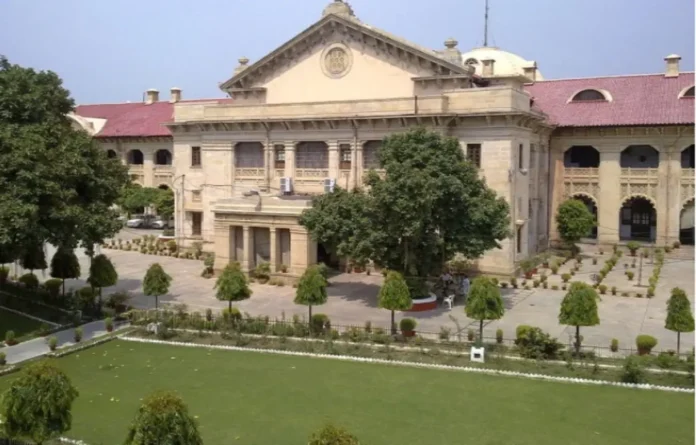The Allahabad High Court while dismissing an appeal observed that merely because the parties may have remained separated due to their jobs with one working at Jhansi and the other at Auraiya, the fact occurrence of desertion may never be sustained on the strength of such vocational/employment compulsion faced by the parties.
The Division Bench of Justice Saumitra Dayal Singh and Justice Donadi Ramesh passed this order while hearing an appeal filed by Arvind Singh Sengar.
The Appeal has been filed under Section 19 of the Family Court Act, 1984, arising from the order dated 10.02.2011 passed by Principal Judge, Family Court, Kanpur Nagar in Case (Arvind Singh Sengar Vs Smt Pratibha Singh), whereby the divorce case instituted by the appellant, has been dismissed.
Hindu marriage between the parties was solemnised on 12.05.1999. One child was born there from 20.06.2000. According to the appellant, the parties have been living separately since 29.06.2003.
At the relevant time, the appellant was working as a Loco Pilot at Jhansi, whereas the respondent got selected as a Primary Teacher in 2000. She got posted at a school situated at Village Hazaripur, Block Ajitmal, Auraiya, which was barely 2 kms away from the ancestral home of the appellant.
The Court noted,
In such circumstances, the appellant is disclosed to have first instituted proceedings seeking restitution of conjugal rights on 11.01.2003. First, it was decreed ex parte on 19.05.2004. Later, the said ex parte judgment and order was recalled at the instance of the respondent on 19.04.2006. That proceeding was thereafter dismissed as withdrawn at the instance of the appellant. The divorce suit was later instituted in 2007, on the ground of desertion and cruelty alleged. As to the ground of desertion, as noted above, according to the appellant, the respondent deserted the appellant in September, 2003. He led oral evidence. The respondent disputed that claim.
As to the evidence, the respondent led oral evidence and also documentary evidence in the shape of paper to establish that on 29.06.2003 and 30.06.2003 she was unwell and for that reason, she had been hospitalised at Awadh Hospital, where the appellant came to visit her. She further claimed through a Certificate issued by the Principal (of her school), that the appellant visited the said school with the respondent on 01.07.2003, when medical leave was granted to the respondent from 02.07.2003 to 23.7.2003.
That facts being proven, the basic allegation made by the appellant that the respondent had deserted the appellant in June 2003, was rightly disbelieved by the Court below. No other evidence appears to have been led to establish the fact of desertion claimed by the appellant.
Further, the Court below has taken note of the fact that the school, where the respondent was posted was situated in District Auraiya and that it was barely 2 km away from the ancestral home of the appellant. That fact is admitted to the appellant.
In that context, it is difficult to disbelieve the further case of the respondent that she had obtained posting at District Auriaya with full knowledge and consent of the appellant.
The Court observed,
Though, the appellant disputes that fact, in the totality of the facts and circumstances of the case proven by the parties and in absence of any contrary material/evidence available on record, we do not find any fault in the finding recorded by the Court below that there was no willful or continued desertion by the respondent.
Whether the appellant wanted the respondent to apply for posting at Jhansi or not remains an unproven fact. While the appellant asserts that the respondent never applied for such transfer, no evidence was led to prove such fact.
As to cruelty, no evidence appears to have been led to establish that the institution of the criminal case by the respondent, either in 2004 alleging demand of dowry under Section 498A, 323, 109 IPC or in 2006 alleging other offence under Section 452, 323, 504, 506, 324 IPC was false or that no such occurrence had taken place. Both cases are disclosed to be pending.
As to oral evidence led in these proceedings, in the first place, the element of cruelty alleged was not established by the appellant, at the same time, the respondent was able to lead evidence to indicate that the appellant had tried to remarry during the subsistence of his first marriage with the respondent and also that there was demand of dowry made from the family of her sister-in-law, who is married to the elder brother of the appellant.
“In the totality of the facts and circumstances of the case, we find no credible material or evidence led by the appellant to discredit or doubt the findings recorded by the learned Court below. Consequently, we find ourselves in agreement with the view taken by the learned Court below,” the Court further observed while dismissing the appeal.


